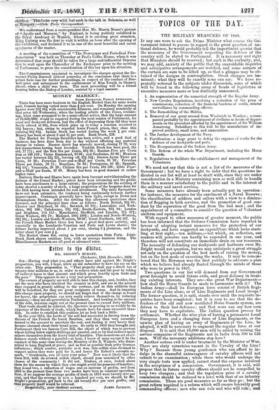Ittttr to tOt etlitnr.
HR. BRIGHT'S BUDGET.
Chichester, .13th December, 1859. Son—Having read what you and others have said against Mr. Bright's proposition, you will, I hope, allow an old subscriber to have his say on the other side. This proposition is, "That property shall pay a direct tax of twenty-four millions or so, in order to relieve trade and the poor by taking off indirect taxes to that amount and which press heavily upon trade and the poor." This appears to me a very just proposition. The owners of property are well able to bear this charge, and, besides, they are the men who have involved the country in debt, and are at the present time engaged in greatly adding to the revenue, and in this addition they will be benefited, for they are great recipients of taxes. And in imposmg this charge upon property, we should not forget that if the charge is found too heavy, the proprietors can very easily relieve themselves, by reducing taxation,—they are all-powerful in .Parliament. And looking at the amount of the debt, taxation ought not at the present time to exceed forty millions. That trade should be relieved, the Spectator is proving to us weekly by its exposure of the frauds of trade, which frauds have for cause excessive taxa- tion. In order to establish this position let us look back a little. In the year 1814, the Lords of the soil had succeeded in forcing down the throats of the French the hated Bourbon and they then very naturally turned to the account to ascertain the cost', and finding it very heavy they became alarmed about their broad acres. So early in 1816 they brought into Parliament their too famous Corn Bill, the object of which was to prevent wheat falling below eighty shillings per quarter, and so by that indirect mode relieve themselves from the heavy load of taxation. This monstrous act of sel- fishness stands without a parallel—at least, I know of none except it be the conduct of this same class during the Ministry of Sir R. Walpole, who deter- mined to keep England at peace,. and as free as possible from petty German influences; which resolve, patriotic as it was, this selfish class declined to support unless they were paid for it, and hence Sir Robert's sarcastic re- mark, "Gentlemen, you all have your price." Now was it likely that the Corn Bill, with its avowed selfish object, should pass unnoticed by other classes of the community ? It did not. Traders, at once, looked about them for the means by which they also might avoid the pressure of taxation; they found two, a reduction of wages and an increase of profits, and from 1815 to the present time these two modes have been in constant operation. Now, if we suppose the average profits of trade in 1816 were twenty-five per cent, and that the average is now a hundred per cent, we should, by Mr. Bright's proposition, get back to the old twenty-five per cent profits, and thus property itself would be relieved.


























 Previous page
Previous page